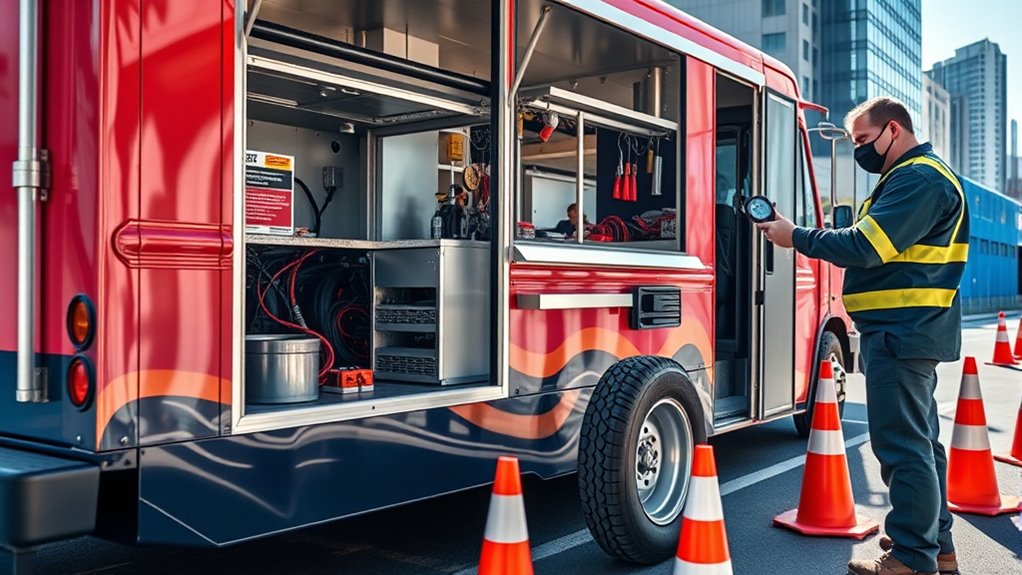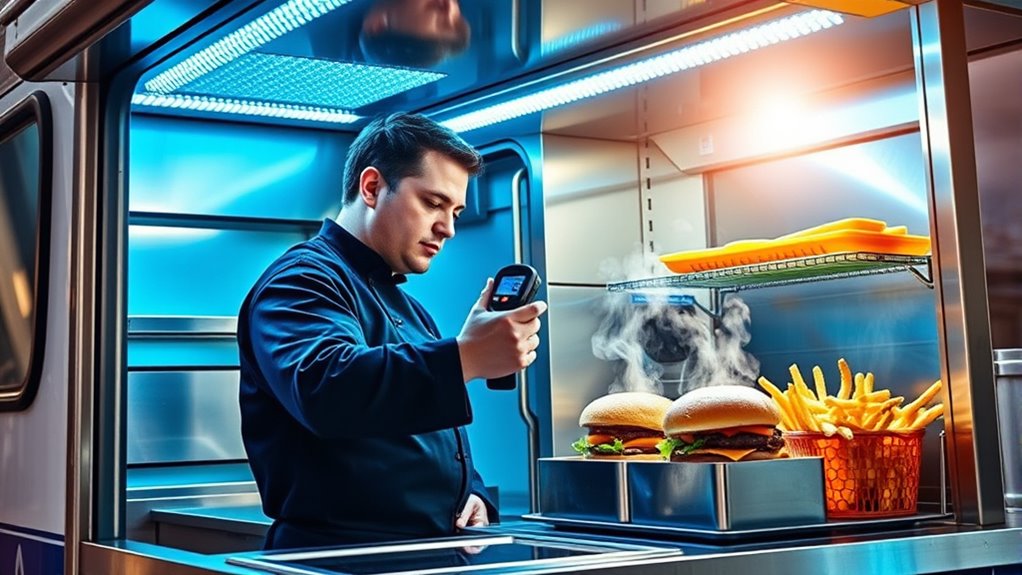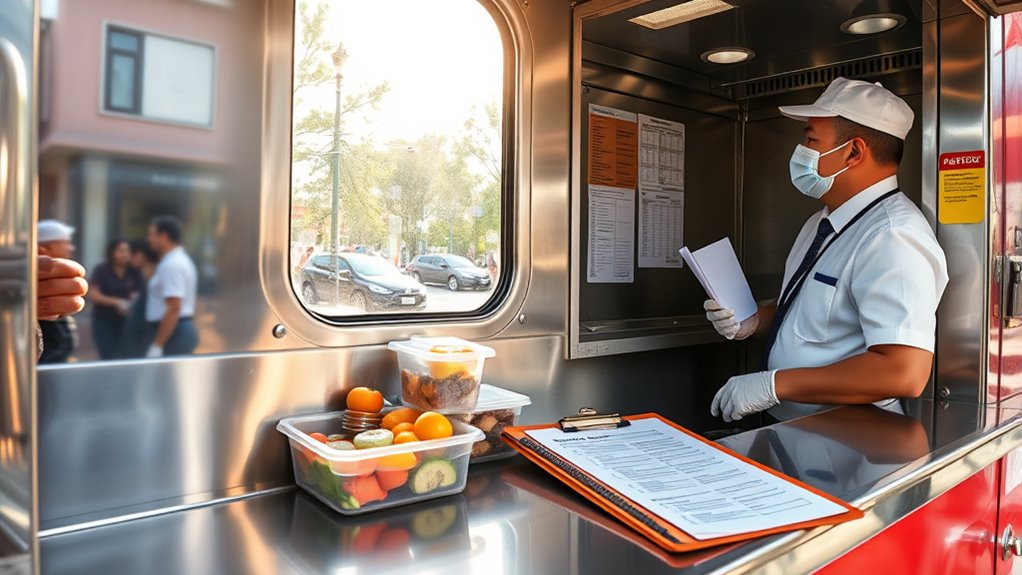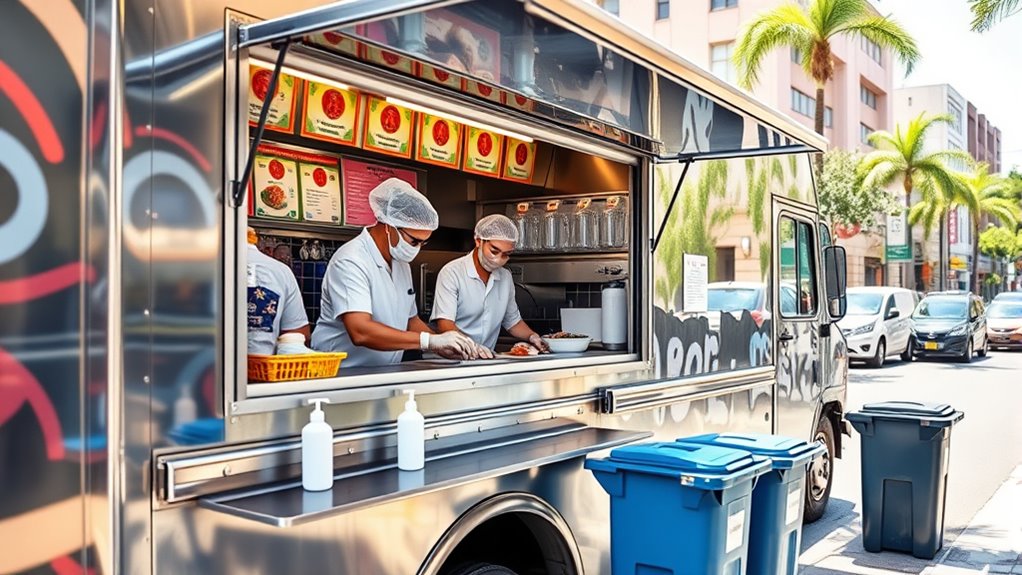To guarantee health and safety compliance for your food truck, you need to follow local regulations, obtain necessary permits, and maintain vehicle safety through regular inspections. Proper food handling, storage, and temperature control are critical to prevent illnesses. Keep your truck clean, follow sanitation protocols, and prevent cross-contamination. Proper waste disposal, pest control, staff hygiene, and detailed recordkeeping also matter. Stay on top of these requirements to operate safely—and there’s more essential information to explore if you continue.
Key Takeaways
- Obtain all necessary local permits, health licenses, and parking approvals to ensure legal operation.
- Conduct regular vehicle safety inspections and maintenance to prevent breakdowns and ensure compliance.
- Maintain proper food temperatures, storage, and handling practices to prevent foodborne illnesses.
- Follow strict sanitation, cross-contamination prevention, and waste management protocols for safety and hygiene.
- Train employees on hygiene standards, safety regulations, and recordkeeping to ensure ongoing compliance.
Understanding Local Regulations and Permits

Steering local regulations and permits is essential for ensuring your food truck operates legally and safely. As a mobile vending business, understanding the specific licensing requirements in your area helps you avoid fines and shutdowns. Many cities require health permits, business licenses, and parking approvals before you start serving customers. Additionally, some areas have zoning laws that restrict where you can operate. Your branding strategies play a role here too—clear signage and consistent branding can help you meet local signage regulations. Keep in mind that regulations can vary widely, so research thoroughly and stay updated. Securing the proper permits demonstrates professionalism and builds trust with your customers, setting a strong foundation for your food truck’s success. Staying informed about local health regulations and compliance standards is also crucial for maintaining a reputable operation.
Food Handling and Storage Standards

Ensuring proper temperature control, safe food storage, and preventing cross-contamination are essential for food truck safety. You need to keep perishable items at the right temperatures and store foods separately to avoid mix-ups. Following these standards helps protect your customers and keeps your operation compliant. Incorporating proper organization into your storage practices can further reduce risks and ensure efficient workflow.
Proper Temperature Control
Maintaining proper temperature control is essential for keeping food safe and preventing foodborne illnesses on your food truck. You need to guarantee that hot foods stay above 140°F and cold foods remain below 40°F. Regularly monitoring temperatures with a reliable thermometer helps you catch issues early and demonstrate your commitment to safety, which can strengthen your food truck branding. Proper temperature control also boosts customer engagement by reassuring patrons that their health is your priority. Avoid leaving perishable items out for extended periods and always store foods at the correct temperatures. Consistent temperature monitoring is key to ensuring ongoing compliance and safety. By following these standards, you protect your customers and uphold your reputation, creating a trustworthy environment where great food and safety go hand in hand.
Safe Food Storage
Are you storing your food properly to prevent contamination and spoilage? Proper food storage starts with organizing ingredients based on your menu planning and cooking techniques. Keep raw meats separate from ready-to-eat foods, and store perishables at appropriate temperatures, ideally below 40°F. Use airtight containers to prevent cross-contamination and extend shelf life. Label items with dates to monitor freshness and avoid waste. Regularly check storage units for cleanliness and signs of spoilage. Incorporate safe handling practices, like avoiding overstacking and ensuring proper airflow. By maintaining proper storage standards, you reduce risks and ensure food safety. Electric dirt bikes are also an example of specialized equipment that requires proper maintenance and storage to ensure optimal performance. Continuous attention to these details supports quality cooking techniques and a well-organized menu, keeping your food truck compliant and your customers safe.
Cross-Contamination Prevention
Cross-contamination is a leading cause of foodborne illnesses in food trucks, so it is crucial to handle and store ingredients correctly. Proper practices help prevent the transfer of harmful bacteria and allergens. First, always follow strict handwashing protocols; wash hands thoroughly before and after handling different ingredients. Second, keep raw meats separate from ready-to-eat foods to avoid cross-contact. Third, use color-coded cutting boards and utensils to distinguish allergen-containing ingredients. Fourth, implement effective allergen management by clearly labeling foods and training staff on allergen risks. Additionally, sanitize surfaces regularly and store ingredients at appropriate temperatures. Incorporating Ice Cream Recipes into your menu should also follow these safety practices to avoid contamination. By adhering to these steps, you minimize cross-contamination risks, protect your customers, and maintain compliance with health standards.
Sanitation and Cleanliness Practices

Ensuring proper sanitation and cleanliness is essential for food truck operators to prevent foodborne illnesses and meet health regulations. You should follow strict handwashing protocols, making sure employees wash their hands thoroughly and frequently, especially after handling raw ingredients or using the restroom. Maintaining a consistent cleaning schedule helps keep surfaces, utensils, and equipment sanitary. Regularly disinfect counters, cooking areas, and sinks to prevent bacteria buildup. Keep trash bins covered and emptied often to avoid contamination. It’s also important to inspect your truck daily for cleanliness, promptly addressing spills or messes. Additionally, utilizing professional equipment can ensure higher standards of hygiene and efficiency. By adhering to these practices, you reduce health risks and guarantee a safe environment for both staff and customers. Consistent sanitation is key to long-term compliance and reputation.
Vehicle Safety and Maintenance Requirements

You need to regularly inspect your food truck to make certain it meets safety standards and is roadworthy. Performing routine maintenance checks helps identify issues before they become serious problems. Staying on top of vehicle inspection standards keeps your truck safe for you and your customers. Incorporating vehicle safety and maintenance requirements into your routine can help prevent accidents and ensure compliance with local regulations.
Vehicle Inspection Standards
Regular vehicle inspections are essential to keep your food truck running safely and compliant with regulations. These inspections ensure your vehicle’s safety, maintain vehicle branding, and support route optimization. To stay on top of standards, focus on these key areas:
- Brakes and tires – Check for wear and proper function to prevent accidents.
- Lights and signals – Ensure all lights are working for visibility and safety.
- Fluid levels – Maintain correct oil, coolant, and brake fluid levels.
- Structural integrity – Examine the chassis and body for damage or rust that could compromise safety.
Conduct these inspections regularly, especially before long routes or busy event days. Staying proactive helps avoid violations, keeps your truck in top shape, and guarantees your branding looks professional while optimizing your routes efficiently.
Routine Maintenance Checks
Have you scheduled routine maintenance checks to keep your food truck operating safely and efficiently? Regular inspections help maintain fuel efficiency and prevent breakdowns. Check the engine, brakes, tires, and fluid levels frequently. Proper signage maintenance is also vital—ensure all safety signs and operational notices are clear and in good condition. Keeping signs visible and legible helps staff and customers stay informed about safety protocols. Don’t forget to clean and inspect ventilation systems and cooking equipment to prevent fire hazards. Maintaining your vehicle’s electrical system and lighting ensures safety during late-night operations. Scheduling these checks consistently not only enhances safety but also reduces costly repairs and improves your truck’s overall performance. Staying proactive with maintenance safeguards your business and keeps your food truck compliant with health and safety standards. Additionally, understanding vehicle safety guidelines can help identify potential risks before they become serious issues.
Employee Hygiene and Training

Why is employee hygiene and training essential for food truck safety? Proper hygiene prevents cross-contamination and keeps customers safe. Well-trained staff understand the importance of following handwashing protocols and maintaining employee uniform standards. To ensure safety, focus on these key areas:
- Regular handwashing with soap and water, especially after handling raw ingredients or using the restroom.
- Wearing clean uniforms that are appropriate for food handling.
- Proper glove use when necessary, avoiding contact with ready-to-eat foods.
- Ongoing training sessions to reinforce hygiene practices and updates on safety regulations.
- Maintaining awareness of AI security vulnerabilities that could impact digital safety protocols within the establishment.
Proper Food Temperature Control

Maintaining proper food temperatures is essential to preventing bacteria growth and ensuring food safety on your food truck. When you control temperatures effectively, you protect your customers and uphold your reputation. Keep hot foods above 140°F and cold foods below 40°F, using calibrated thermometers to monitor consistently. Proper food presentation involves displaying items at safe temperatures, which reassures customers about quality and safety. Your menu design should consider how to keep foods at their ideal temperatures during service, simplifying storage and handling. Avoid overcrowding refrigeration units and use appropriate containers to maintain consistent temperatures. Regular checks and proper training ensure your team understands temperature controls. Additionally, understanding the importance of contrast ratio in your refrigeration units can help optimize their performance and energy efficiency. By prioritizing these practices, you minimize risk and deliver fresh, safe, and appealing dishes every time.
Waste Disposal and Pest Control

Proper waste disposal and pest control are critical to maintaining a safe and hygienic food truck environment. You must follow local composting regulations and practice waste segregation to reduce contamination risks. Here are key actions to take:
Effective waste management and pest control are essential for a safe, hygienic food truck environment.
- Separate recyclables, compostables, and trash to comply with waste segregation rules.
- Use sealed, leak-proof containers for waste to prevent pests and odors.
- Regularly clean and sanitize waste areas to deter pests and bacteria.
- Schedule routine waste pick-ups, especially for compostable and organic waste, to stay compliant with regulations.
- Consistent maintenance and cleaning of waste disposal areas enhance hygiene and prevent pest infestations.
Recordkeeping and Inspection Preparedness

Keeping accurate records and staying prepared for inspections are essential components of food truck safety and compliance. Regularly document food temperatures, cleaning schedules, and pest control efforts to demonstrate adherence to health standards. Proper recordkeeping guarantees you can quickly provide necessary information during inspections, avoiding delays or penalties. Use social media and marketing branding to communicate your commitment to safety and transparency, which can build customer trust. Maintain organized files of permits, training certificates, and inspection reports in a dedicated spot on your truck or digital system. Staying proactive with these practices helps prevent violations and keeps your operation running smoothly. When inspections are imminent, review all records and ensure your truck meets health department requirements, so you’re always ready to showcase your dedication to safety. Additionally, understanding asset division laws can help you manage the division of company assets efficiently if your food truck business is involved in legal proceedings.
Frequently Asked Questions
How Often Should Safety Drills Be Conducted on Food Trucks?
You should conduct safety drills regularly to guarantee emergency preparedness and effective staff training. Ideally, perform drills at least quarterly, so your team stays confident and ready to handle emergencies. Regular practice helps identify weaknesses in safety procedures, keeps staff alert, and ensures everyone understands their roles during crises. Consistent drills foster a safety-first culture, reducing risks and promoting a quick, coordinated response in real emergencies.
What Are the Penalties for Non-Compliance With Health Regulations?
Think of facing penalties for non-compliance as walking a tightrope like Icarus. If you ignore health regulations, you risk legal fines and license suspension, which can ground your food truck dreams. Authorities take safety seriously, and penalties are designed to enforce compliance. Staying within the rules helps you avoid costly fines and keeps your license intact, ensuring you can keep serving delicious food without interruptions.
How Can Food Trucks Prevent Cross-Contamination Effectively?
To prevent cross-contamination, you should focus on proper food prep and strict cleaning protocols. Always keep raw and cooked foods separate, using different cutting boards and utensils. Wash your hands frequently and sanitize surfaces thoroughly. Regularly clean equipment and storage areas to eliminate bacteria. Training staff on these practices helps guarantee everyone understands the importance of preventing cross-contamination, keeping your food safe and compliant.
Are There Specific Insurance Requirements for Food Truck Safety?
You need to understand that insurance coverage and liability requirements are essential for your food truck. You should secure extensive insurance that covers property damage, personal injury, and food-related liabilities to protect your business. Ensuring you meet specific insurance requirements helps you comply with local regulations and safeguards you against potential claims. Always review your local laws and consult with an insurance professional to tailor coverage that fits your food truck’s unique needs.
What Technological Tools Assist in Maintaining Health and Safety Standards?
You might think technology complicates your work, but mobile apps and digital checklists actually streamline maintaining safety standards. They help you stay organized, guarantee routine inspections, and track maintenance effortlessly. With real-time alerts, you can address issues immediately, reducing risks. Using these tools keeps your food truck compliant, minimizes errors, and saves time, so you can focus on serving great food while confidently meeting health and safety requirements.
Conclusion
Staying compliant with health and safety standards is essential for your food truck’s success. Did you know that 48% of food truck violations are related to sanitation issues? By understanding regulations, maintaining cleanliness, and properly training your staff, you can avoid costly fines and protect your customers. Prioritize safety and stay prepared for inspections—you’ll build a trustworthy reputation and keep your business thriving.









